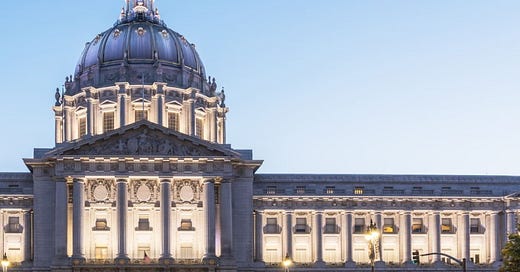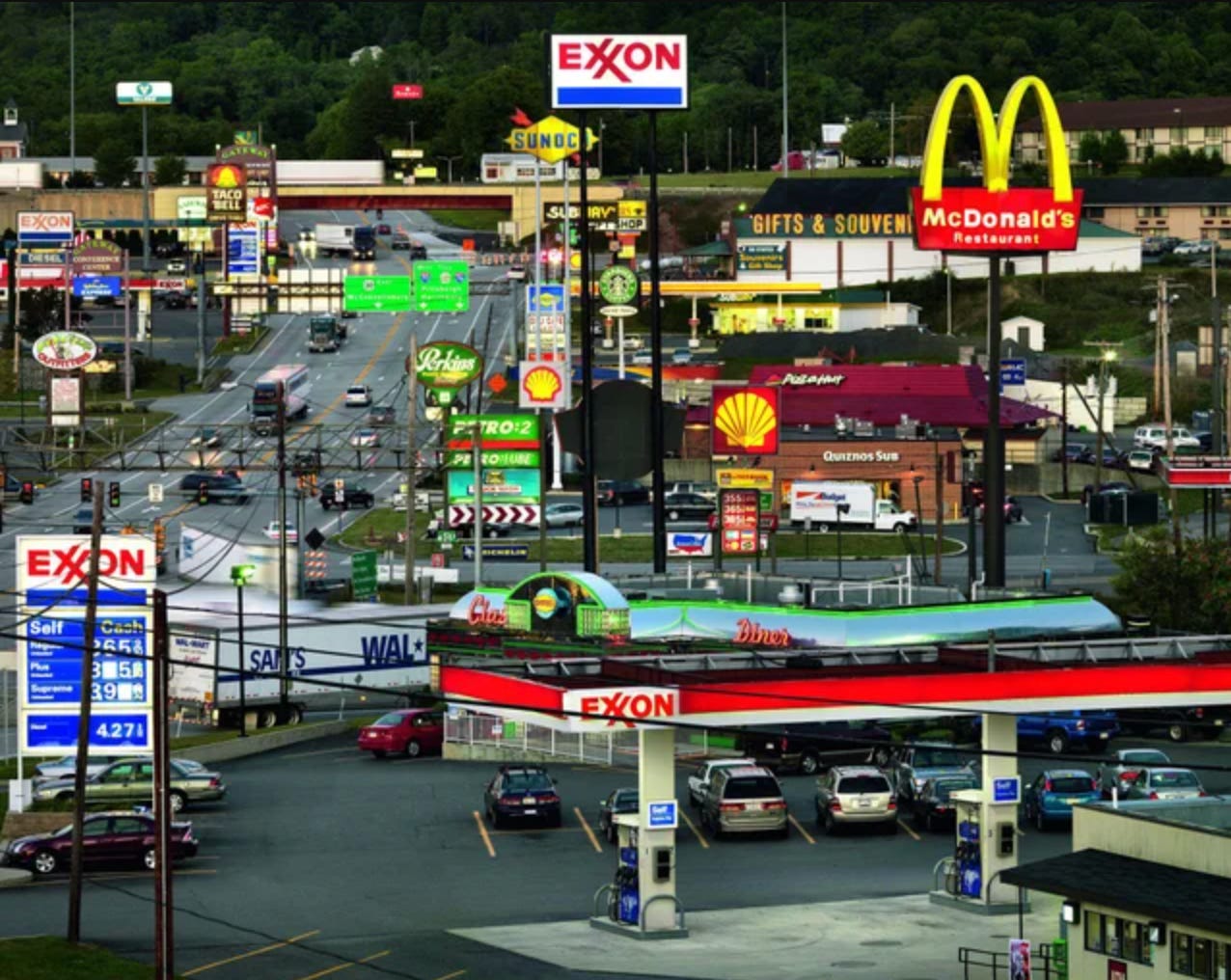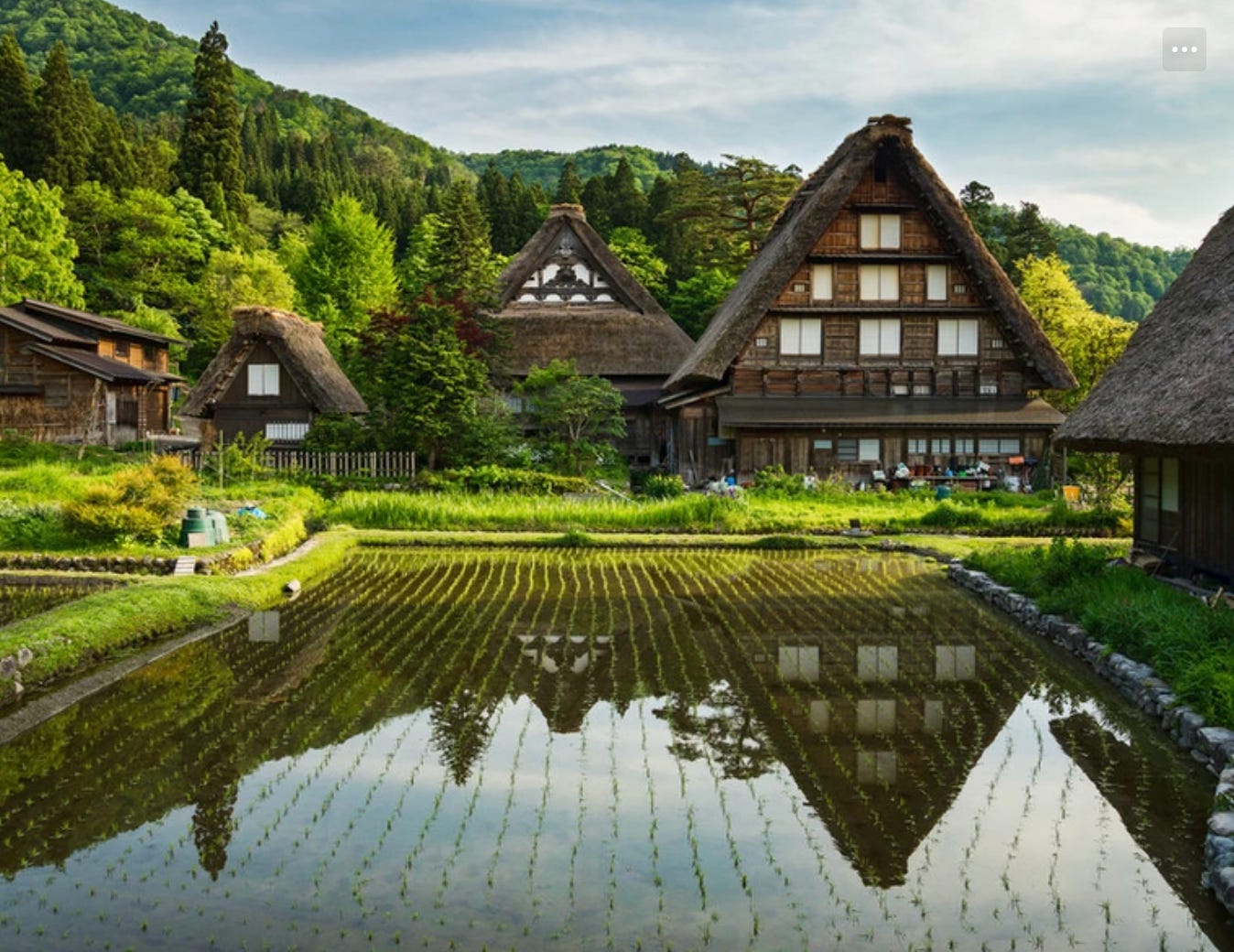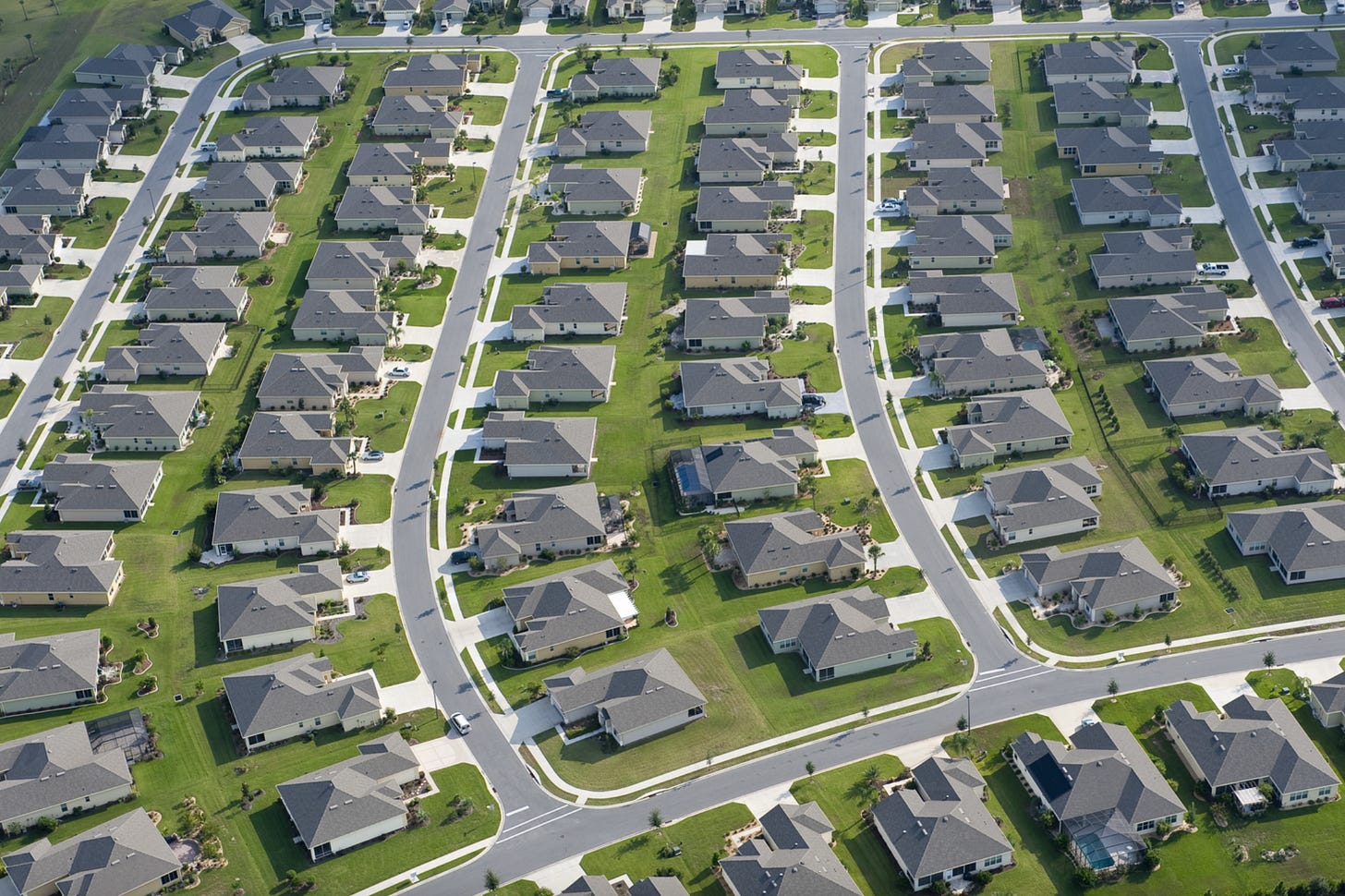My ambition is to create what I’ve called the Civic Society.
The word “civic” has taken on a bureaucratic and sometimes annoying connotation. But historically, it has been understood as the involvement of the people of a place with the improvement and social wellbeing of that place — a community, whose parts can usually get along.
In a large, (post-)industrial country like the United States, this sort of unity appears rarely, but is sometimes simulated in times of stress and the period directly afterwards. (Take WWII or 9/11 as an example.) This seems to be an unavoidable consequence of the mere size (both in land and population) of the US. However, history suggests it may be possible to create a civically cohesive empire with some upstream effort on the part of an elite class.
The problem is that there are no discrete “bugs in the system” — there is no single thing that went wrong to create the fractured, obese, unsightly America that we have inherited.
This requires an extensive and sober analysis of American life that has been attempted by many philosophers over the past few decades. Postmodernists had some clever observations about the reality of Americanism, consumption, and the nature of power, but ultimately their disgraced intellectual inheritors may have made things worse with their prescriptions.
Populists of recent years have emphasized only a part of the Civic Society (financial security for the lower and middle class) and paid little attention to the realistic role of elites and the broader implications of a materialist culture.
Conservative thinkers are bound to outdated liberal policies, always playing catch-up. There is no overarching conservative vision that promotes anything of substance, or anything that needs to be “conserved” from the more distant past. Conservatives do not seem to have much of a sense of what they want at all, besides opposing liberals and their excesses with some vigor at times.
Liberals, and their progressive strain, do not wish to confront themselves with the reality of natural, biological inequality, or that those inequalities can present in uncomfortable ways, thus presenting race-to-the-bottom political feel-good schemes that damage the social ethos (i.e., some people are not as emotionally energetic or up to date as demanded, rendering them bigots, or heartless, or ignorant — stoking resentment).
But these are diseased American problems.
There is a simplicity in small villages around the world: their conviviality flows from their shared history, jokes, dinners, views… which we increasingly lack in the United States. Our “villages” (unending suburbs and HOA communities) are composed of members who rely on each other not at all, and who share no days of the week with each other, no meals with each other, no pain with each other. This is a tragedy on a level never seen until now, and is still remarkably under-appreciated and under-observed.
My ambition is to make this fact appreciated and observed — and reversed.
This requires a new state, perhaps outside of the United States, that will act as the test tube for the Civic Society. Eyes have been cast to the Caribbean in recent years — but generally, almost any Third World country would probably be optimal. However, the Civic Society is ultimately meant for America, as are the following specifics:
Revitalization of urban and rural culture through suspension of over-corporatized entertainment, lifestyle, food, etc.
On a more granular level, the “aesthetic” of a place should either follow the new dominant cultural aesthetic, or the new, spontaneous, local aesthetic. This means large companies are prohibited from overly visible logos/labeling and cost-efficient-but-ugly modernist buildings. McDonald’s cannot hoist its arches.
Reharboring of cultural mores and values through entertainment, advertising, social media.
Destruction of lazy, unsustainable, ugly buildings with a no-tolerance policy. Many suburbs demolished, as well as many urban buildings (which are often in the brutalist style, like the exemplary Boston City Hall). This would be a truly vast undertaking.
Craft is returned to local artisans to the most realistic extent. This is an unassuming demand with enormous attendant economic challenges, but those will be explored later. The thrust is that cheap consumption will be lessened, and that communities will tend to make things for themselves. Plastic is exemplary of what is undesirable and will mostly be banned.
Some things, like emergency medicine, might not work well with localism, but services like Life Flight will be more feasible as a subsidy of the public purse. Current rates for these kinds of emergency services are prohibitively high.
The notion of what a “moderate” is for the average person is majorly recalibrated. Politics will be reorganized around respect for tradition, responsibility, and true civic cohesion, and overly novel social trends will be heavily scrutinized.
The Civic Society will be highly fulfilling, rejecting norms of the late 20th and early 21st century (marked by boredom, loneliness, and malaise). Societal goals — like technological innovation with the express goal of improving the American public, general notions of “glory” and advancement, realism regarding social roles — are clear.
Free markets are encouraged for innovation, efficiency, and wealth creation — but carefully monitored and limited when intersecting directly with the public so as to prevent moral and morale degradation. The Civic Society seeks to dampen the blunt impact of commercialism, and to partition the capitalist, powerful engine of an advanced society from the masses.
Over-efficiency in biology is cancer. Yet we tend to be slow to characterize over-efficiency in the corporate world the same way — but all things must achieve equipoise. Capital is important, but not more important than social stability, which it can assist or decay. Civilization is effort: it is the countering of natural entropic functions from which humans never achieved liberation, despite our impressive intelligence. The incentives of pure capital do not correspond to the health and stability of a people, and could eventually hurry along civilizational entropy.
But importantly: wealth is encouraged. Part of the project of the Civic Society is creating a high-class public. So, wide-use industries are legally obliged to maintain certain standards. Take the decline of air travel for example, which will be revitalized.
Poverty will not receive special treatment from the government, but low-income housing will still be elegant and beautiful (if simple) in keeping with the new aesthetic standards. The poor will be called to more noble ends: most hard drug use is absolutely forbidden and met with severe penalty. No-fault divorce and other antisocial behavior will be forbidden if a couple has children. Government assistance may be possible, but only after agreeing to certain demands, like sensible spending, which will be automatically audited. Cleanliness of one’s property will be encouraged.
It is taught and understood that tradition is an important link to the past that must be maintained, and that heritage is powerfully important for the human psyche.
Education is guided by strict standards. Teachers are carefully vetted to support dominant cultural perspectives — that is, strange, corrosive beliefs proposed to students in earnest are not permissible. Instead, the values outlined here are taught, in addition to subjects like advanced math; ancient languages; fine arts; thorough history; sophisticated natural sciences beyond (but certainly including) today’s biology, physics and chemistry; and rhetoric/philosophy.
There is careful analysis and monitoring of suicide rates to determine the mental health of the public and the efficacy of the regime’s programs (the CCP for example has produced a many-percentage-point decrease in suicides over the past few decades, and currently has one of the lowest incidence of suicide of the developed countries).
The physical health of the people is seriously and carefully monitored. Harmful foods are unequivocally banned. Fast food and soda companies, for example, are liquidated. Obese people are taxed at greater rates, or else some other financial incentive is in place if we are to be more oblique about it. (This is not out of mere “fatphobia,” but out of the recognition that obese people are more likely to be hospitalized or otherwise suffer from medical issues, which any sort of remotely socialized medicine should not tolerate. However, there are systemic pressures reducing the amount of food that encourages obesity in the first place.) The pharmaceutical industry faces incisive audits (its current form is likely disassembled) and corporatized hospitals are roundly forbidden. Alternatively, the sicker people are, the more those companies are penalized, flipping the current incentive paradigm on its head. (Perhaps it would need to be the case that they are rewarded by the state for low sickness rates.)
“Collapse” must be a feasible possibility in the back of the public’s mind. Nation-wide systems (like energy and food storage) will be developed to activate in the case of some large-scale breakdown, and these systems and the possibility of their use will be of constant institutional discussion. This has the psychological effect of making people value the present, value social harmony, and value advancement. This does not mean that it will be a society of fear (indeed the possibility of collapse can be exciting and energizing): technology and its use will also be emphasized, partly as symbolic of the glory awaiting us in the future — with the possibility of major setbacks along the way.
A civic society is composed of cells. Cities of a million or more cannot be conducive to a civic society — interpersonal networks are ground down in the fast-paced culture and architectural distance. The Civic Society promotes the development of small- to medium-sized communities. Today, these tend to be associated with poverty and classlessness. But in the Civic Society, resources are more geographically dispersed. Consider the tranquil elegance of Japanese hill villages with their charming vernacular style — juxtaposed to the endless suburbs of America. There is a certain internality and self-sufficiency to the Japanese village (its culture, community, and production), whereas the American suburb seems to act as nothing more than a profit node for distant firms.
These societal cells are encouraged to develop strong local traditions. In ancient times, villages would gather regularly around the communal fire to dance and sing. In Greece, people sang hymns to the rising sun together. Medieval peasants congregated to praise God at church. All humans since time immemorial have done something similar. But local sociability today is not common. People prefer mass events which they attend with a few others, or small friend-group activities, or, worst of all, online “communities.” (Additionally, the average number of friends that people self-report to have continues to dramatically fall.) There is very little multigenerational, multi-family group bonding anymore, and this has proved astonishingly destructive to the American mind. Elders are not respected, but partly because they are not respectable. There is no true social interdependency. All one’s material needs are provided by a highly efficient centralized system of production, and one’s emotional needs can be met (or quelled) by readily available entertainment. This is a cultural sickness gripping the entire developed world: there are similar personal reports in Europe and China of oppressively lonely living conditions.
I have identified beautiful, integrated architecture and the amount of space towns and cities occupy as central components of the Civic Society’s effort, from which, if strictly outlined, other broad political and economic decisions flow. Wang Huning, premier ideologue of the CCP, has developed insightful descriptions of modernization, Marxism, and traditionalism. But his prescriptions are not clear and not specific. He returns cozily to the reform mindset — adjusting percentages, pumping up numbers, and to his furthest extent heavily taxing the rich. But this is the error of many modern politics: we act towards nebulous, vague goals that seem good for their own sake, not for how they change our tangible lives, not to beautify the world we daily inhabit (the CCP continues to build stultifying high-rises and nature-less, dense urban centers of tens of millions of people). A highly specific and focused goal of “beautiful, small-scale architecture,” however, identifies the rot at the center of American society, that of alienation, individualism, and materialism.
We are often told of the glory of being in one’s 20s, to cherish “the college years,” and so on; soon, life will be drudgery. Certainly, youth comes with many advantages, but in traditional societies old age did too. The sage councils the warrior. This crucial element has been erased — the elderly of 2021 are “boomers,” those who in the ‘60s and ‘70s rejected notions of responsibility even in child rearing. Life was for living, for throwing off antiquated constraints. They were the first generation to be raised in the suburbs. From 1955 to 1975, the suicide rate among young people rocketed from 5 to 22 per 100,000. Of course, this is because of many changing variables in the world during that period, but the dispersal and thinning of community played no small role. This is a concrete yet criminally under-considered piece of social transition. Wang Huning, as far as I have read, does not explore it — instead, his analysis is merely of real estate prices and house sizes.
Importantly, there will be a recognition of the failures and limitations of an empire that is too centrally planned. Delegation and localism are of paramount importance. Localism in a post-industrial world does require a strong central backbone, however, which this regime, the Civic Society, offers. This resembles what the United States was supposed to be, but its founders took “civility” for granted. The Civic Society is built out of public education of what civility means.
More to come.












